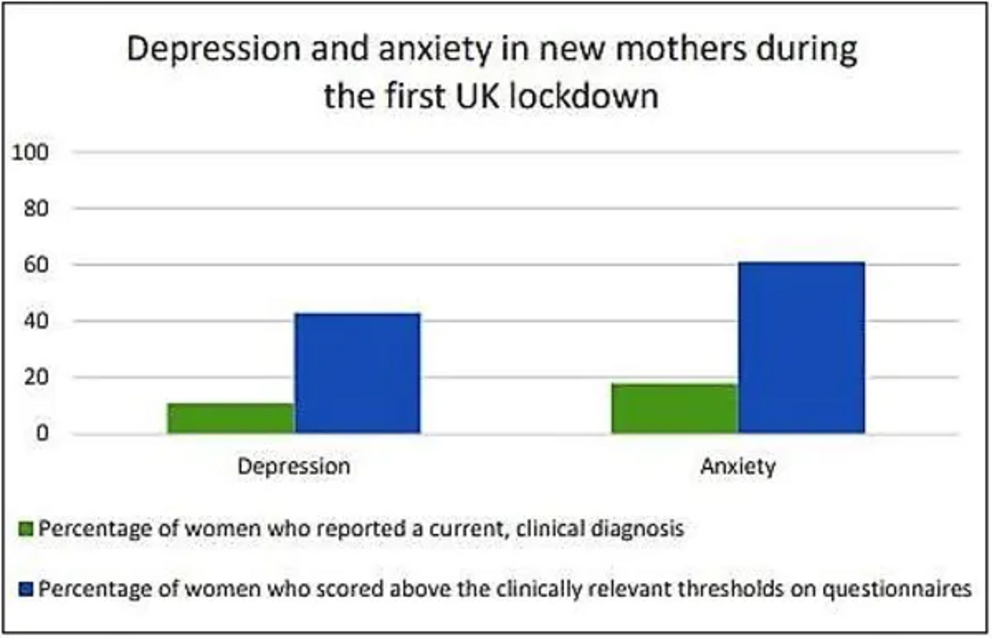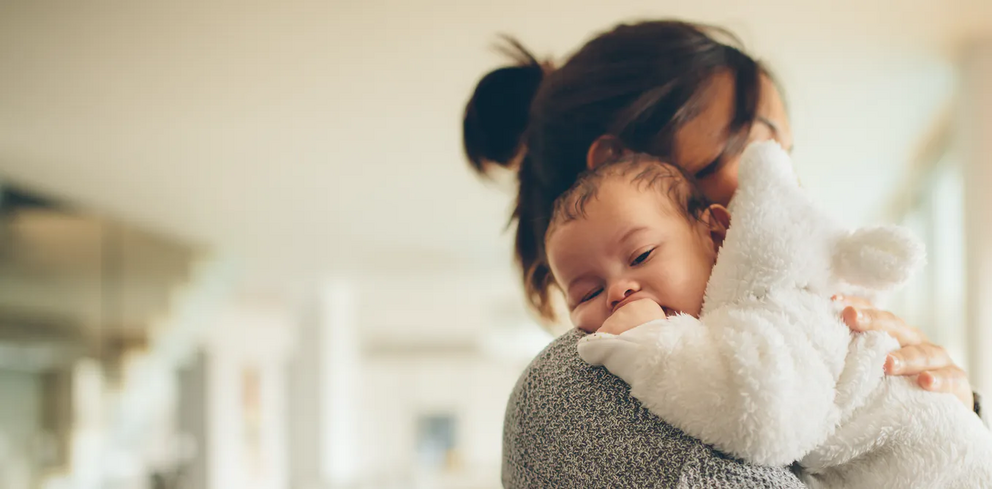Lockdown study finds undiagnosed mental health crisis among new mothers
New mothers experienced worryingly high rates of depression and anxiety during the first lockdown, our new research has revealed. One of the major contributing factors to them feeling this way was the psychological impact of social distancing measures.
Our study examined the psychological and social experiences of over 600 women with babies between birth and 12 weeks old during the first UK lockdown.
We wanted to understand prevalence rates of “clinically relevant” maternal depression and anxiety. By clinically relevant, we mean mothers who scored above a certain threshold on questionnaires normally used by clinicians when they assess and diagnose mental health conditions.
Usual rates of depression and anxiety after birth in the UK are around 15%. Our survey found similar rates, with 11% of women reporting they already had a current clinical diagnosis of depression and 18% reporting an existing clinical diagnosis of anxiety. However, when we explored this further we actually found that a much higher proportion were experiencing depression and anxiety – they just did not have a formal clinical diagnosis yet.
This was revealed when we examined how many of the mothers scored above the clinical threshold on the mental health questionnaires they completed. The findings were deeply concerning. We found that 43% of the women met the criteria for clinically relevant depression and 61% met the criteria for anxiety.
 Our study showed high rates of undiagnosed depression and anxiety in new mothers during the first UK lockdown.
Our study showed high rates of undiagnosed depression and anxiety in new mothers during the first UK lockdown.
This means that over a third of the women who met the criteria for depression and anxiety did not report having a current clinical diagnosis.
We also asked mothers whether they felt their feelings or relationships had been affected by the introduction of social distancing measures. Our analysis found that the perceived psychological impact of social distancing was the main contributing factor influencing feelings of depression and anxiety.
Disruption to motherhood
It has been well established that the early postnatal period is a time of vulnerability for depression and anxiety. But our study shows that maternal mental health after birth is compromised even further when combined with the stresses of the pandemic.
During the first UK lockdown in March 2020, new mothers experienced major disruptions to care and support. These included reduced in person access to postnatal health services such as health visitor appointments, breastfeeding counselling and baby weigh-in clinics.
New mothers had reduced social support from family and friends due to lockdown restrictions. Birth partners were also not able to support the mother during the labour and birth of their baby due to hospital visiting restrictions.
While these measures were essential in minimising the spread of COVID-19, the psychological risks of having a baby during this time have received much less attention.
Our findings are even more troubling when considering the subsequent lockdowns which mothers have experienced since March 2020 – particularly during the winter months. The cumulative effect of lockdowns on maternal mental health has yet to be studied in detail. But we do not expect it will be any better now than it was last year.
Protect maternal wellbeing
We believe our study has highlighted a maternal mental health crisis which requires urgent attention and intervention. High rates of depression and anxiety during the pandemic have also been found in other developed countries, indicating that UK mothers are not alone when it comes to mental health.
There is already consistent evidence that postnatal depression and anxiety are linked to a range of negative outcomes outside of COVID-19 in terms of the health, development and behaviour of children. There is a need for longitudinal research to address the short and long term consequences of the pandemic on maternal mental health.
We also know that reduced access to diagnosis and treatment during the pandemic is likely to further affect mental health, widening the gap between the prevalence of poor mental health and diagnosis and appropriate treatment. That is why we are calling for the government to protect maternal wellbeing by improving and maintaining access to perinatal mental health care during the pandemic and beyond.
Although NHS resources and staff are under unprecedented strain, it is crucial that mental health interventions are timely and meet mothers’ needs to prevent the escalation of symptoms and prevent additional burden to the NHS. Interventions must be developed with flexibility to ensure they work in both this and any future health crises.
One positive that can be drawn from our research is that over 80% of women did not experience changes in how they felt about their relationship with their baby. Perhaps this indicates that despite all the disruptions and restrictions encountered when having a baby during lockdown, the mother-infant relationship remains stable. This should provide some small comfort to those families waiting for some form of normality to return.

